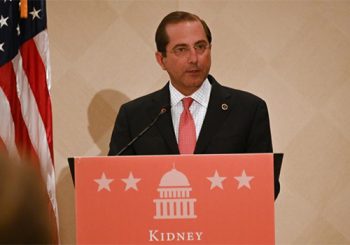
Innovation to Advance Home Therapies and Value Based Care | FMCNA
Our focus on innovation has long helped define and advance the renal care industry, and the investments we continue to make will transform it for the benefit of our patients and the broader health system.
Recent activities demonstrate our ongoing focus and commitment. We launched a strategic partnership with Humacyte, an innovative organization that is currently developing a human acellular vessel for vascular access. Through our merger with NxStage Medical, Inc and their laser focus on therapy and patient experience, we also expect to significantly increase the number of treatments carried out in a home setting. In addition, we have been working to expand value based care through the Dialysis PATIENTS Demonstration Act, which had strong bi-partisan support in the last Congress, and other demonstrations offered by the Center of Medicare and Medicaid Innovation that are designed to reform payment models that will incentivize improved home dialysis care, kidney transplantation rates and late stage chronic kidney disease (CKD) care.
While addressing kidney patients and advocates with the National Kidney Foundation, Health and Human Services Secretary Alex Azar outlined an ambitious effort to move the treatment of end stage renal disease (ESRD) to more home dialysis therapy and value based care, while increasing efforts to treat CKD earlier in the disease process.
Dr. Frank Maddux, Chief Medical Officer for Fresenius Medical Care, led a series of presentations and panel discussion around value based care and home treatments for a physician audience at a recent Medical Office Live event. It was a timely and important discussion in the wake of the Secretary’s comments only days before.
“While peritoneal dialysis or home hemo may not be possible for absolutely everyone, they can often be more convenient, better for patients’ independence and self-sufficiency, and better for their physical health,” said Secretary Azar, whose father lived with kidney failure by doing his own peritoneal dialysis at night before receiving a transplant.
Secretary Azar also emphasized the need to expand proven value based models of care that have enabled providers to develop more coordinated and comprehensive care programs. With these programs, we have become the largest provider of value based care services for ESRD in the country. In his speech, he specifically cited those efforts for saving “almost $2,000 per patient per year in Medicare costs, reducing hospitalizations while maintaining quality of care.”
“We support Secretary Azar’s commitment to improving kidney health and transforming the way that care is delivered,” said Bill Valle, CEO of FMCNA. “That is why we have long been determined to advance the expansion of value based care, develop and invest in new innovations and expand access to home dialysis therapies.”
According to Secretary Azar, the Centers for Medicare and Medicaid Services (CMS) is now looking to expand this value based care program beyond patients with ESRD to include stage 4 kidney disease. This effort will work to identify CKD earlier in the disease state in order to prevent or delay kidney failure, giving patients more time to prepare and make good choices for treatment including transplant and home therapies.
“We want to empower people living with kidney disease to thrive and succeed with treatment options that best fit their lifestyle, while continuing to support education and innovation that slows the progression of the disease,” said Valle. “We look forward to continuing our partnership with the Administration to address the factors that drive the uptick in new ESRD cases and the corresponding need for alternative care models including transplant, transitional care and home care.”
Additional Resources:


